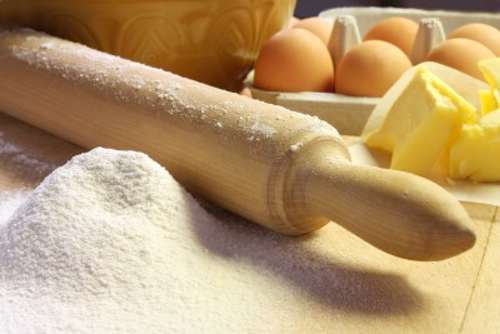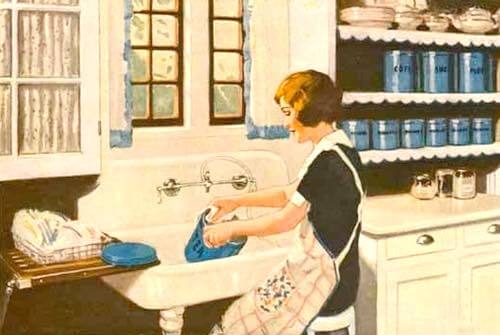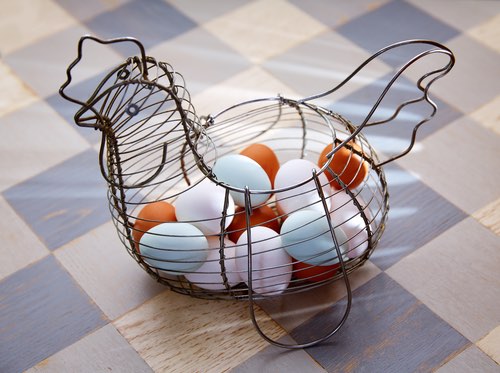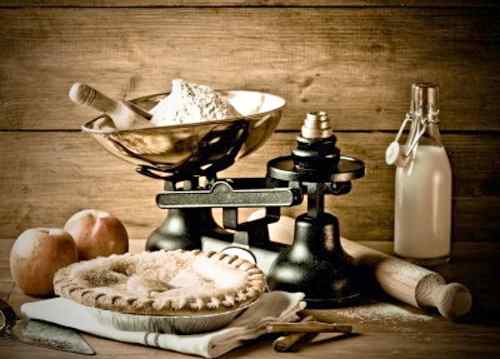- Home
- Recipe Help & Misc
- Grandma's Household Tips
Grandma's Household Tips
Grandma's household tips often came to her rescue not only in the kitchen, but throughout her home, and the garden. You learned to be self-reliant back in her day.
There weren't any Home Depot® stores to run to when you had an emergency! You were on your own, and you simply made do with whatever home remedies you had available.
Whether it's driving off your dog's fleas, preventing rust on tools, learning how to make a rag rug, or how to destroy roaches, you might find the answers you need on this page.
Grandma's Household Tips
Young's Demonstrative Translation of Scientific Secrets (1861)
Buckeye Cookery and Practical Housekeeping (1877)
The Perry Home Cook Book (1920)
The White House Cook Book (1913)
Mom's Recipe Scrapbooks (1920s)
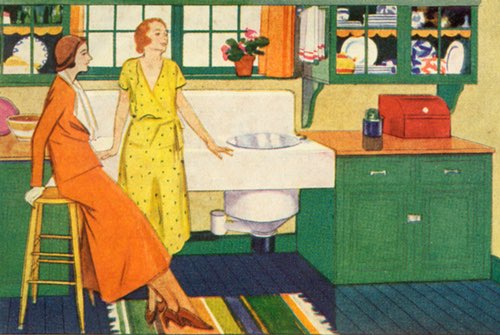 Sharing Grandma's Household Tips and Tricks
Sharing Grandma's Household Tips and Tricks(Source: Adapted by Don Bell)
Troublesome Ants

A heavy chalk mark laid a finger's distance from your sugar box and all around (there must be no space not covered) will surely prevent ants from troubling.
To Keep Flies Off Items
Boil three or four onions in a pint of water and apply with a soft brush, let dry.
To Prevent Lost Children
Label children's hats, scarves, etc., with the name and place of residence so that, if lost, they may be easily restored.
To Soften Hard Water
 Baking Soda will Soften the Bath Water
Baking Soda will Soften the Bath Water(PD Source: Baking Soda Ad c.1900)
Hard water becomes nearly soft by boiling.
Coal Ashes For Walking On
Make excellent garden walks with coal ashes. They become very hard by use, and no weeds or grass will grow through them.
To Temper Glass
Lamp chimneys and glassware for hot water are made less liable to break by putting in cold water, bringing slowly to boiling point, boiling for an hour, and allowing to cool before removing from the water.
To Start a Fire In Damp, Still Weather
Of all Grandma's household tips, this is the one she used most mornings to light the fire in her kitchen wood stove before baking.
Light a few bits of shavings or paper placed upon the top of grate; thus by the heated air's forcing itself into the chimney and establishing there an upward current, the room is kept free from the gas and smoke which is so apt to fill it, and the fire can then be lighted from below with good success.
To Preserve Old Books
Bindings may be preserved from mildew by lightly brushing them over with spirits of wine. A few drops of perfumed oil will secure libraries from the consuming effects of mold and damp. The Romans used oil of cedar to preserve valuable manuscripts.
To Care For Books
Grandma's household tip performs well. However, placing the leaf between absorbent tissues and tightly closing the book for a few moments before removing the tissues also works. Leave the book open to dry completely.
If water is spilled on the leaf of a book, put the leaf between to blotting papers and carefully iron first on one site, then on the other. The leaf will not then crinkle.
To Hang Pictures
The cheapest and best material with which to hang pictures is copper wire, of a size proportioned to the weight of the pictures. When hung the wire is scarcely visible, and its strength and durability is wonderful.
To Remove a Rusty Screw
Apply a hot soldering iron to the head for a short time, the screwdriver being applied immediately while the screw is hot.
Finish For Room
A room with plain white walls is finished beautifully by placing a black walnut (or the same wood with which the room is finished) molding, around the room where the border of paper is usually placed, at the junction of wall and ceiling.
The molding, finished in oil, is easily put up. The upper edge should be rounded, and a space of a quarter inch left between it and the ceiling.
To hang pictures, buy an "S" hook, sold at all hardware stores, place one hook over the molding, hang the picture cord on the other, and slip to the right or left to the desired position. This saves the wall from injury for picture nails.
Laying Carpets
Grandma's household tip offers wise advice to save you time and money today
A carpet wears better if put down well, and it is better to have it done by experienced persons when the expense can be afforded and such help can be had.
Stair Carpets
They will wear much longer if extra thicknesses of paper are placed over the edge of each stair, the full width of the carpet, before fastening down.
A Cheap Carpet
Make a cover for the floor of the cheapest cotton cloth. Tack it down like a carpet, paper it as you would a wall with paper resembling a carpet in figures, let it dry, varnish with two coats of varnish, and with reasonable usage it will last two years.
To Soften Corks
When corks are too large to go into a bottle, throw them into hot water a few moments, and they will soften.
To Keep Cutlery From Rust For Storing
Wipe dry, and wrap in coarse brown paper.
To Prevent Iron Rust
Kerosine applied to stoves or farming implements or tools, during summer, will prevent their rusting.
To Destroy Cockroaches
The following is said to be effectual: These vermin are easily destroyed, simply by cutting up green cucumbers at night, and placing them about where roaches commit depredations.
What peel is cut from the cucumbers in preparing them for the table answers the purpose as well, and three applications will destroy all the roaches in the house. Remove the peelings in the morning, and renew them at night.
To Banish Rats or Mice
Grandma's household tip has been proven to work, but not on every occasion, and the cayenne pepper needs to be replenished to be effective.
Sprinkling cayenne pepper in their holes will banish them.
Everlasting Fence Posts
I discovered many years ago that wood could be made to last longer than iron in the ground, but thought the process so simple and inexpensive that it was not worthwhile making any stir about it.
I would as soon have poplar, basswood, or quaking ash as any other kind of timber for fence posts. I have taken out basswood posts after having been set seven years, which were as sound when taken out as when they were first put in the ground. Time and weather seemed to have no effect on them. The posts can be prepared for less than two cents a piece (circa 1860 prices).
This is the fence post recipe: Take boiled linseed oil and stir it in pulverized charcoal to the consistency of paint. Put a coat of this over the timber, and there is not a man that will live to see it rotten.
Honey Uses
My father was a beekeeper, and he often used Grandma's household tip when stung by honey bees. Simply rub honey on the skin after removing the bee's stinger.
Honey is good for sore throat; also good for bee stings.
For headache
2 or 3 slices of lemon in a cup of strong tea will cure or help to relieve a nervous headache.
For Bilious Headache
A teaspoonful of lemon juice in a small cup of black coffee will relieve a bilious headache.
To Mend a Crack On Inside of Iron Kitchen Range
Use a filling made of equal parts of wood ashes and common salt, made up into paste with a little water, and plastered over the crack. This will prove hard and lasting whether the stove, etc., be cold or hot.
To Mend Cracks In Wooden Floors
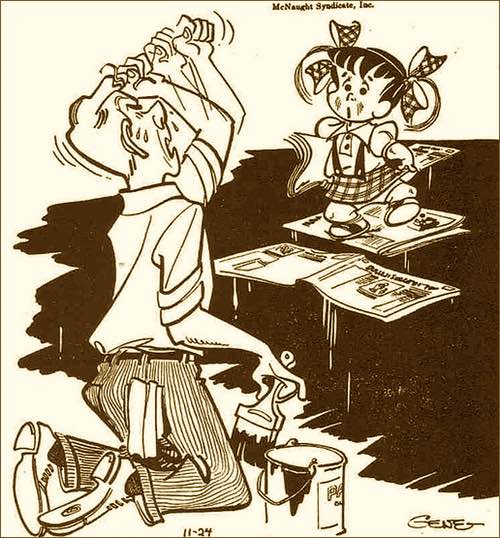 "But Daddy, I'm NOT stepping on the paint!"
"But Daddy, I'm NOT stepping on the paint!"(Source: Angel Face 1957 - PD)
These may be filled neatly and permanently by thoroughly soaking newspapers in paste made of half a pound of flour, three quarts of water, and half a pound of alum.
The mixture will be about as thick as putty. It can be forced into the cracks with a case-knife and smoothed on top. It will harden like papier-maché, and the floor can be varnished, if desired.
To Mend Cracks In Plaster
A good filling is plaster of Paris mixed with vinegar, which will not set for twenty or thirty minutes, while water will set very quickly, often before you can use it. The putty-like mass must be pushed into the cracks, and can be smoothed off evenly with a table-knife.
To Keep Out Red Ants

This page offers several of Grandma's household tips for keeping out ants, so be sure to try them. Is that an ant now?
A small quantity of green sage placed in a pantry will keep out red ants.
To Cure a Burn
Cut open and scrape a raw potato, bind on burn. Repeat if burning sensation returns.
Cure for Hiccoughs
Sit erect and inflate the lungs fully. Then, retaining the breath, bend forward slowly until the chest meets the knees. After slowly rising again to the erect position, slowly exhale the breath.
Repeat this process a second time, and the nerves will be found to have received an excess of energy that will enable them to perform their natural functions.
Flowers May be Kept Very Fresh Overnight
If they are excluded from the air. To do this, wet them thoroughly, put in a damp box, and cover with wet newspaper, then place in a cool spot.
To Clean Hands
Tomato juice will remove stains from and whiten the hands.
To Keep Bar Soap
For Grandma's household tip to work with modern soaps, you must first remove the bar of soap from its wrapper so it can thoroughly dry in the air.
Not only does dry bar soap last longer, but it leaves less of a soap residue in the soap dish. Folks, Grandma's household tips really work!
It is a great saving to have bars of soap dry. Dry, hard bars will last longer when used. It should be bought by the quantity.
To Soften Hands
Mutton tallow is considered excellent to soften the hands. It may be rubbed on at any time when the hands are perfectly dry. Another good rule is to rub well in dry oatmeal after every washing, and be particular regarding the quantity of soap.
Cheap soap and hard water are the unknown enemies of many people, and the cause of rough skin and chapped hands. Castile soap and rain water will sometimes cure without any other assistance.
To Soften Hands After Soapsuds
One can have the hands in soapsuds with soft soap without injury to the skin if the hands are dipped in vinegar or lemon juice immediately after. The acids destroy the corrosive effects of the alkali, and make the hands soft and white.
To Soften Hands Where Roughened
Indian meal and vinegar or lemon juice used on hands where roughened by cold or labor will heal and soften them. Rub the hands in this, then wash off thoroughly.
All-Natural Lavender Kitchen Deodorizer
 3D Anaglyph Image of a Beautiful Field of Lavender
3D Anaglyph Image of a Beautiful Field of Lavender(Source: ©ifeelstock/Depositphotos.com)
A custom which my mother has adhered to ever since I can remember and which I think a very charming one is to burn lavender seeds to perfume the house.
After a meal has been prepared there is apt to be an odor of cooking, be it what it may; the best and most agreeable way of dispelling this is to put a teaspoonful of ordinary lavender seeds (which are inexpensive to buy) in a frying pan, and let them cook and smoke gently for a short while on the stove.
The result is a delicate scent of lavender all over the house and there is non pleasanter. —Jessie Heath Caldwell in The Queen
Lavender to Drive Off Fleas
Sprinkle about area a few drops of oil of lavender.
Lavender to Repel Moths
Instead of smelly moth balls, try using dried lavender blossoms, dried mint leaves, or cedar shavings (the kind available as pet bedding works well).
The odors of these natural materials are pleasant, yet they repel moths, and there are no dangers involved as with moth balls. Always avoid the use of moth balls.
To Prevent Wooden Bedsteads Creaking
If a bedstead creaks at each movement of the sleeper, remove the slats beneath the mattress, wrap the ends of each in old newspapers, and then replace them beneath the mattress.
To Prevent Cracking of Bottles and Fruit Jars
If a bottle or fruit jar that has been more than once used is placed on a towel thoroughly soaked in hot water, there is little danger of its being cracked by the introduction of a hot liquid.
To Preserve Oil Cloth
If oil cloth be occasionally rubbed with a mixture of beeswax and turpentine, it will last longer.
Packing Glass Bottles, Jars
You will want to remember Grandma's household tip on moving day!
Rubber bands slipped over them will prevent breakage.
To Remove Window Putty
A red-hot iron will soften old putty so that it can be easily removed.
To Make Rag Rugs
Cut rags and sew hit and miss, or fancy-striped as you choose; use wooden needles, round, smooth, and pointed at one end, of any convenient length. The knitting is done back and forth, always taking off the first stitch. —Anna F. Hisey
To Make a Rustic Picture Frame
A neat, rustic frame for pictures may be made of cattail rods. Hide the corners where they are joined with handsome autumn leaves and the berries of bittersweet.
To Make an Ant Trap
Procure a large natural sponge, wash it well and press it dry, which will leave the cells quite open; then sprinkle it with fine white sugar, and place it near where the ants are troublesome.
The ants will soon collect upon the sponge and take up their abode in its cells. It is then only necessary to dip the sponge in boiling water, when the ants will be destroyed, and it may be set over and over again.
To send Messages in Cypher
Grandma's household tip can keep kids busy playing secret agents and spies on cold and rainy days.
Any document wrote in cypher, by which signs are substituted for letters, or even for words, is liable to be deciphered. The following plans are free from such complaint:
The correspondents select two copies of the same edition of a book, the word to be used is designated by figures referring to the page, line, and number of the word in the line.
Or, the message may be written on a slip of paper wound spirally around a rod of wood such as a common broomstick; these can only be deciphered by bringing them into their original position, by wrapping around a second rod of the same size.
Castor Oil as a Dressing for Leather
Castor oil, besides being an excellent dressing for leather, renders it vermin-proof; it should be mixed, say half and half, with tallow or other oil. Neither rats, roaches, nor other vermin will attack leather so prepared.
Substitute For a Corkscrew
Here's three substitutes for corkscrews you can try:
- A convenient substitute for a corkscrew, when the latter is not at hand, may be found in the use of a common wood screw, with an attached string to pull the cork.
- Stick two forks vertically into the cork on opposite sides, not too near the edge. Run the blade of a bread knife through the two, and give a twist.
- Fill the hollow at the bottom of the bottle with a handkerchief or towel; grasp the neck with one hand, and strike firmly and steadily with the other upon the handkerchief.
To Keep Up Old Sash Windows
This is performed by means of cork, in the simplest manner, and with scarcely any expense. Bore 3 or 4 holes in the sides of the sash, into which insert common bottle cork, projecting about the sixteenth part of an inch.
These will press against the window frames along the usual groove, and by their elasticity support the sash at any height which may be required.
For a Flower Bowl
Remember Grandma's household tip when needing to display an arrangement of flowers.
Cut a round piece of stiff paper the shape and size of the top of an ordinary bowl. Cut or punch holes in it, as many as desired, for the stems of real or artificial flowers. Fit paper in bowl and put flower stems through holes.
Old Fashioned White Wash Recipe
7-1/2 pounds unslaked lime, 1-1/2 pounds rock salt, 3/4 pounds cement. Dissolve salt in 1 gallon of cold water. Pour the salt solution on the lime. Next add 1-1/2 gallons of water to the lime slowly allowing it to slake (it will get very hot).
Finally, sprinkle the cement on a little at a time and stir mixture thoroughly. Be sure to apply this wash while it is still hot.
The white wash will take about 2 days to harden, but after it hardens it will withstand almost any amount of rain or washing.
Warning: DO NOT spill the liquid white wash mixture on your skin or clothing. It gets very hot, and lime will burn.
To Make Rice Glue
Of all Grandma's household tips, this one remains very practical. Rice glue is an excellent all-natural adhesive for use in scrapbooks and for book restoration.
Mix rice flour smoothly with cold water, and simmer it over a slow fire, when it will form a delicate and durable cement, not only answering all the purposes of common paste, but well adapted for joining paper and cardboard ornamental work.
Economy In Carpets
In buying a carpet, as in everything else, those of the best quality are cheapest in the end. As it is extremely desirable that they should look as clean as possible, avoid buying a carpet that has any white in it.
Even a small portion of white interspersed through the pattern will in a short time give it a dingy appearance.
If you cannot obtain a hearth rug that exactly corresponds with the carpet, get one entirely different, for a decided contrast looks better than a bad match.
Warning
Always use Grandma's household tips with caution and common sense, and always AT YOUR OWN RISK.
There is NO GUARANTEE the old fashioned tips will be compatible with or effective on today's materials, and some methods might prove destructive.
About Grandma's Household Tips
Grandma's household tips were ones she gleaned from almanacs and newspapers to provide her with handy, innovative solutions to persistent problems around the house.
Such tips were often passed down from parents to children, and now these same practical solutions might make it possible for you to solve some of your pesky household problems too.
Enjoy experimenting with Grandma's household tips and problem solvers. You're likely to find a tip or two that just might help you with your persisting problem.
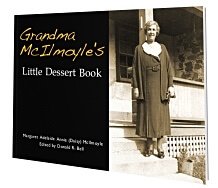
Sign Up now for GRANDMA'S DESSERT CLUB and download your FREE PDF COPY of Grandma McIlmoyle's Little Dessert Book. Also receive my regular Bulletin featuring classic recipes and nostalgia.
